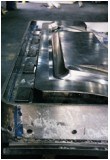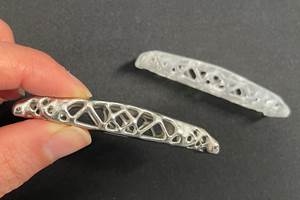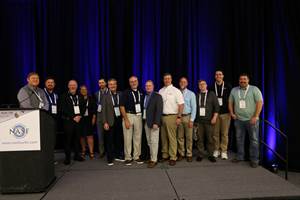Hale Chrome Expands Hard Chromium Operation
A philosophy of doing things its own way has allowed Hale Chrome to expand its facility ...
Probably one of the most classic Seinfeld episodes of all time was "The Opposite Show." You remember. The one where George Costanza decides to do the opposite of every instinct he has ever had in his entire life and everything works out perfectly for him. Well, not only is it a funny story for Rick Deye, owner and president of Hale Chrome Service, Toledo, Ohio, it has become part of his business philosophy.
"When some people say black, I say white. I am doing exactly the opposite," stated Mr. Deye. At a time when some companies are abandoning hexavalent chromium (a.k.a. hard chromium) for alternative surface finishes because of supposed environmental problems, Hale Chrome has done just the opposite and expanded its hard chromium operation. This latest expansion was needed so that Hale Chrome could handle new business, which was a result of some companies abandoning hard chromium and Hale Chrome finding additional uses for the process.
During Mr. Deye's tenure, Hale Chrome has gone through three expansions. Each time the company added more space to its existing building and increasingly more capacity, from 15 tons in 1984 to 30 tons in 1990 to 50 tons in 1991. All three expansions were dedicated to handling large compression molds for the automotive, recreational truck and home building industries.
When Hale Chrome decided to expand again so that it could plate more and larger molds the natural progression would have been to add on to the existing building. But Mr. Deye felt this would take the company away from its roots. So Hale Chrome did the opposite again and refocused on specialty plating jobs weighing two tons or less. To outsiders this may have seemed like a dramatic change for the company, but to Mr. Deye it was just a part of his philosophy. Mr. Deye explained, "Some of our competitors opted to get out of small specialty work. So we decided to go the opposite route and jump right in." Not only did Hale Chrome go back to its roots, it decided to build a completely new facility instead of adding to the existing building.
The new building, completed in July 1998, is the start of Hale Chrome's complete hard chromium plating complex. The complex consists of three divisions: production; small specialty; and large specialty. The latest addition houses the small specialty plating shop, while the production and large specialty shops are located in the original building. Every year Hale Chrome dedicates about $150,000 for capital improvements, which for the next several years will be allocated to revamping the production and large specialty divisions so they will have the same standards as the small specialty shop.
| The interior of this eight-ton van rear-side window interior trim mold was plated for a fiberglass composite manufacturer. |
Each division does work for a variety of industries. However, the automotive industry accounts for the largest portion of Hale Chrome's work; about 40 to 45% of total sales. The production shop plates brake pins for the automotive and truck industry, high-wear tooling, hydraulic cylinders and electronic components. The large specialty shop handles compression molds, feed screws, rolls and large shafts, body panel stamping dies and castor molds for the steel mill industry. The small specialty shop plates hard chromium on plastic mold tooling, pultrusion and extrusion dies, injection molds and general machine tooling. These are just a few of the industries that each division serves.
Hale Chrome's complex consists of 18 tanks, 14 hard chromium tanks and four cleaner/stripping tanks. All of the tanks are manually operated. While many companies are looking for ways to automate their processes, Hale Chrome has decided to stick with manual lines. The company has hired consultants to determine ways to automate, but really there is no place for it. It all goes back to Mr. Deye's opposite philosophy. "We have remained labor intensive while other industries have automated their processes and developed new production methods. But, when you develop skilled labor and have people that can work with their hands and are mechanically inclined, you have a competitive advantage and an ability to diversify that other companies do not," said Mr. Deye.
All of the hard chromium baths are mixed at the shop by a full-time chemist. The chromium crystals for the baths are supplied by McGean-Rohco, Inc., Cleveland, Ohio. Also, all 18 tanks are electronically controlled. The control systems were developed with the help of Chuck Eschmeyer, sales consultant for J.P.S. Technologies, Cincinnati, Ohio. The control process uses electric tank heaters, a chromium solution purification unit and a permanent disc filter. The tanks are analyzed daily and filtered continuously. Another interesting aspect of Hale Chrome's process is that virtually every anode is hand made out of lead or steel because of the nature of Hale Chrome's work. The anodes must be made to conform to the shape of the part Hale Chrome is plating to ensure good coverage to exact dimensions in all recesses and corners.
| All work at Hale Chrome is done by hand, including rinsing. |
Not only has Hale Chrome spent time and money on its new plating complex, but it also spent time and money in developing proprietary hard chromium baths. In 1978, Hale Chrome developed its DyClad bath as an alternative to Armaloy treatments. This bath can be used with both ferrous and non-ferrous metals and is used in all three of Hale Chrome's shops. This surface treatment does not change the dimensions or mechanical properties of the substrate. Advantages of this finish are the elimination of secondary finishing operations, extra hardness, corrosion protection, improved surface retention and circulation of lubricants as well as easy removal when stripping from molds and machine tooling for refurbishing.
Hale Chrome has also developed another bath that is truly its own. Developed with the help of Hale Chrome's customers, DyCro-tuff is a proprietary process that involves approximately seven steps and serves as a surface treatment for the high-tech plastic and rubber mold industries and the stamping die market, where high-quality parts are a priority. The process adds chemical polymers to the plating process that are impregnated into the micro-crack structure of hard chromium. As plastic or rubber is forced through the mold or stamped in a die, the DyCro-tuff surface treatment creates a dry lubricant that protects the surface of the mold. One advantage is that it lets molders eliminate oils and lubricants from their processes, allowing them to run a more environmentally friendly shop. Both Hale Chrome's proprietary process development and Mr. Deye's opposite philosophy have played a part in realizing the company's plan of a complete hard chromium plating complex. But why hard chromium? Why not avoid the supposed environmental problems of hard chromium and plate something that appears to be more environmentally friendly? Why not open a plating complex that involves other surface finishes?
For one, Mr. Deye feels that hard chromium has gotten a bad rap as regards to the environment. Mr. Deye admits that there are some hazards to working with hard chromium, but the employees of Hale Chrome are educated about those hazards and know how to deal with them. In fact, the company has taken every possible precaution to make sure that its facility limits the environmental impact of hard chromium. It runs a closed-loop shop, filtering, reusing and recycling all of its water, keeping extensive documentation for all machinery and processes. Even the water that washes the fumes in the scrubbers goes back into the plating tanks. Also, Hale Chrome has installed five exhaust systems from Vanaire, Louisville, Kentucky, since 1985. These systems are continuously upgraded as well. "I expect that every 10 years the technology will either allow us or force us to upgrade our pollution control systems," stated Mr. Deye. The air and water regulations have not created the high costs that hard chromium has been tagged with for Hale Chrome. Says Mr. Deye, "You can put those regulations to your advantage. By developing 100% recovery, we have actually cut down on our chromium and other related expenses."
| These exhaust hoods, part of Hale Chrome's extensive exhaust system, allow the company to meet all air regulations. |
So, the environmental regulations have not been a problem for Hale Chrome. But why limit yourself to one product? What about branching out into other surface finishes? Hale Chrome has looked into other surface finishes, including various
nickel finishes, plasma coatings and electropolishing. But Mr. Deye decided to stay with hard chromium because he feels it is the most diverse and controllable finish in the industry.
For one, hard chromium is an economical product. The cost of plating hard chromium has not increased as much as other metals. Also, because Hale Chrome's proprietary baths extend the life of molds and dies beyond other products, the company's customers save money in the long run.
Second, hard chromium is not only an economical product, but it is easily refurbished. This is an extremely important fact to the mold and stamping die industry. These industries would face dramatic cost increases if they had to continually build and repair molds to replace worn or used ones. Hard chromium is easily stripped from any substrate using an alkaline solution. This is not true of many other surface treatments, which either cannot be removed at all or can only be removed with an acid solution that damages the substrate. Because hard chromium can be stripped and re-plated, molds can be refurbished to the proper specifications without the substrate being harmed.
A final reason why Hale Chrome has stuck with hard chromium is that it has found that customers are switching from painting their products to plating them with hard chromium. This is especially true of weldments. Mr. Deye feels that this is because his customers are facing regulatory issues within their painting facilities. Therefore, they would rather pass those environmental concerns on to someone else. Also, the end users have found that hard chromium is a more durable and economical product than paint.
All of these factors have led Mr. Deye to continue with his opposite philosophy and create a complete hard chromium plating complex. For George Costanza the opposite philosophy worked purely by chance, but for Mr. Dye it works because of his knowledge about the market.
Related Content
Advantages to Pumped Eductor Agitation
Not all agitation methods are created equally. Pumped agitation with eductor nozzles can improve process tanks and quickly show a reduction in operating costs while keeping staff safe, following environmental legislation and preventing pollution.
Read MorePossibilities From Electroplating 3D Printed Plastic Parts
Adding layers of nickel or copper to 3D printed polymer can impart desired properties such as electrical conductivity, EMI shielding, abrasion resistance and improved strength — approaching and even exceeding 3D printed metal, according to RePliForm.
Read MoreProducts Finishing Reveals 2023 Qualifying Top Shops
Each year PF conducts its Top Shops Benchmarking Survey, offering shops a tool to better understand their overall performance in the industry. The program also recognizes shops that meet a set of criteria to qualify as Top Shops.
Read MoreTroubleshooting Alkaline Zinc
One of the most common problems that can arise when plating with alkaline zinc is an imbalance of brightener in the solution. In this helpful Ask the Expert article, Chad Murphy of Columbia Chemical discusses how different zinc metal concentrations and brightener concentrations can impact efficiency.
Read MoreRead Next
Education Bringing Cleaning to Machining
Debuting new speakers and cleaning technology content during this half-day workshop co-located with IMTS 2024.
Read MoreA ‘Clean’ Agenda Offers Unique Presentations in Chicago
The 2024 Parts Cleaning Conference, co-located with the International Manufacturing Technology Show, includes presentations by several speakers who are new to the conference and topics that have not been covered in past editions of this event.
Read MoreDelivering Increased Benefits to Greenhouse Films
Baystar's Borstar technology is helping customers deliver better, more reliable production methods to greenhouse agriculture.
Read More
.JPG;width=70;height=70;mode=crop)
























